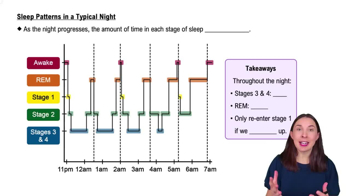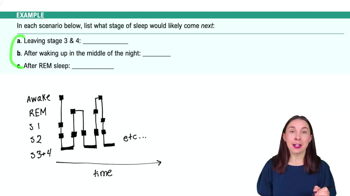Table of contents
- 1. Introduction to Psychology1h 43m
- 2. Psychology Research2h 20m
- 3. Biological Psychology2h 41m
- 4. Sensation and Perception28m
- 5. Consciousness and Sleep32m
- 6. Learning41m
- 7. Memory34m
- 8. Cognition37m
- 9. Emotion and Motivation35m
- 10. Developmental Psychology33m
- 11. Personality48m
- 12. Social Psychology41m
- 13. Stress and Health41m
- 14. Psychological Disorders44m
- 15. Treatment47m
5. Consciousness and Sleep
Sleep
Struggling with Psychology?
Join thousands of students who trust us to help them ace their exams!Watch the first videoMultiple Choice
On Yan's walk to campus one morning, she was thinking about what a nice day it was, how many people were already on campus, and how she had to stop by the bookstore on her way to class. Yan was experiencing
A
waking consciousness.
B
an altered state of consciousness.
C
insight.
D
a meditative state.
 Verified step by step guidance
Verified step by step guidance1
Understand the concept of 'waking consciousness': It refers to the state of being awake and aware of one's surroundings, thoughts, and feelings. This is the normal state of consciousness when a person is not asleep or in an altered state.
Identify the characteristics of Yan's experience: She is aware of her surroundings (the nice day, people on campus) and her thoughts (stopping by the bookstore).
Compare Yan's experience to the definition of waking consciousness: Her awareness of her environment and her thoughts aligns with the characteristics of waking consciousness.
Consider the other options: An altered state of consciousness involves a significant change in perception or awareness, insight involves a sudden realization or understanding, and a meditative state involves focused attention and relaxation.
Conclude that Yan's experience matches the definition of waking consciousness, as she is simply aware and thinking about her day in a typical manner.

 3:25m
3:25mWatch next
Master Circadian Rhythms with a bite sized video explanation from Hannah Gordils
Start learningRelated Videos
Related Practice


































































































![Race, Genes and IQ Differences | Bret Weinstein [Mini Clip]](https://img.youtube.com/vi/IztL_m3pd70/mqdefault.jpg)



































































































